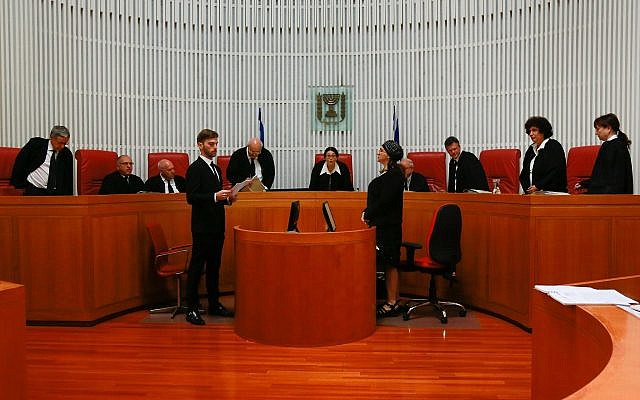Movement for Quality Government told it must seek clarification from Netanyahu on his plans following announcement of criminal charges, before it seeks legal intervention
By TOI STAFF 24 November 2019,

Prime Minister Benjamin Netanyahu at a Likud party rally in Tel Aviv, on November 17, 2019. (Tomer Neuberg/Flash90)
An advocacy group filed a petition Sunday with the High Court of Justice seeking Prime Minister Benjamin Netanyahu’s removal from office as he faces graft charges.
But the court swiftly rejected the appeal by the Movement for Quality Government in Israel, on the grounds that it should have first formally asked the prime minister how he intended to respond to the coming corruption charges before filing its petition.
The movement said in a statement that it accepted the court’s ruling and that it would file the petition again after giving the prime minister time to respond.
Despite filing the petition, the Movement for Quality Government said it still hoped Netanyahu would “come to his senses” and resign of his own accord before the courts get involved.
“He needs to be allowed to exhaust all his [legal] opinions and fight for his innocence as a private person, but woe to us if the prime minister drags the entire country with him to court,” the group said in a statement.
The petition was the first to be filed against Netanyahu continuing to serve as premier since Attorney General Avichai Mandelblit announced last week he would indict the prime minister in a series of corruption cases.
The Labor party has also said it would petition the High Court.

Though the law apparently allows a prime minister to remain in power so long as a final court ruling convicting him has not been given, that law has never actually been tested before — Netanyahu is the first leader in Israel’s history to face criminal charges while in office — and the courts will likely be compelled to debate the issue.
According to Hebrew media reports Sunday, Mandelblit is set to soon rule on whether there are any legal impediments to Netanyahu forming a government in the future.
The attorney general and other top legal officials are also set to evaluate whether Netanyahu must resign once the charges are officially lodged in court or may remain in office unless convicted and all appeals exhausted, and whether he must relinquish the ministerial portfolios he currently holds.
The indictment announcement comes as Netanyahu also grapples with major political challenges, having twice failed to form a government after consecutive elections and now facing an internal challenge in his Likud party.
The Knesset is now tasked with choosing a lawmaker to assemble a government after both Netanyahu and his centrist rival Benny Gantz both failed to do so, raising the prospect of a third round of elections in less than a year. If that doesn’t happen within the 21-day period ending December 11, the Knesset will be dissolved and elections will be called.

Despite having an indictment hanging over him, Netanyahu has vowed to remain prime minister while he fights the charges, though he will likely be forced to give up several ancillary ministries he has held onto in the transitional government.
Netanyahu, in an emotional and defiant address on Thursday, accused prosecutors and justice officials of a “tainted process,” and vowed to “continue to lead Israel… in accordance with the law,” shortly after Mandelblit announced he would charge the premier with fraud and breach of trust in three cases against him, including a bribery charge in the far-reaching Bezeq corruption probe.
Mandelblit’s decision marked the first time in Israel’s history that a serving prime minister faces criminal charges, casting a heavy shadow over Netanyahu, Israel’s longest-serving prime minister, and his ongoing attempts to remain in power.
The announcement did not include the official filing of an indictment, as the Knesset must first decide on whether to grant Netanyahu procedural immunity, a process that — due to the current political gridlock and the lack of a functioning government — could drag on for months.



@ Sebastien Zorn:
THAT’S a question that poses enormous possibilities and outcomes… Never thought of that, but would love to see it……absolutely.
Why can’t Sara Netanyahu sue on her own behalf. The news outlets and govt have scandalised her unmercifully for many years. She is not a public figure really, holding down an everyday job and DONATING her time to the State in other areas. (possibly the latter precludes her from claiming private citizen status….??)
@ Adam Dalgliesh:
I, one of many, not familiar with legalities, do see the emergency which ISRAEL has been facing for decades. all those who are so blind should be permanently
removed from ANY authority. Israeli citizens who know a leader should ROAR TO
MAKE THEIR VOICES HEARD SO ISRAEL MAY SURVIVE……..Eddie
“Technicality???” The Basic Law on government is explicit that the Prime Minister is never obligated to resign from his office, and cannot be fired by anyone. This Supreme Court and Attorney General itruly believe that they above the law, and can overturn laws at will, even the Basic Laws which are Israel’s constitution.
One possible solution that I can see to the rt- Mandelblit problem is for the Knesset to place the Attorney General and all government lawyers whose duty it is to represent the (elected) government’s position before the courts, should be appointed by the Minister of Justice, and subject to dismissal by him/her. Then the Knesset would have to confirm in office a Minister of Justice (such as, probably, the present one) who is willing to do this.
Another, more thorough solution would be for the Knesset to enact as a Basic Law a one-time “Bill of Attainder” (to use the old British term for it),by summarily dismissing from office all those judges and government lawyers who have issued rulings that have no foundation in Israeli law, or are directly in conflict with Israeli law. That would be a much more drastic and hence extremely unlikely solution to be adopted. But I think it may the only way that the emergency created by judges and government lawyers
Can Netanyahu sue Mandleblit and the Deep Shtetl for charging him with violation of laws that don’t exist? https://carolineglick.com/lecture-on-israels-legal-mafia-and-its-war-against-prime-minister-netanyahu/